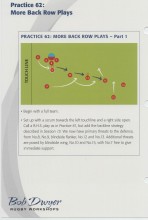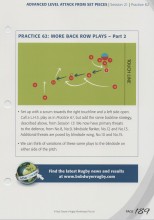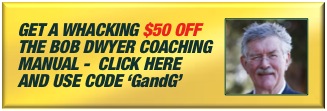There are lots of things to admire about the All Blacks’ play. Their technique is excellent and they execute accurately – not always, as we can see in the final pass for this try, but most of the time.
In this analysis of an attacking play, we go back again to the fundamental truth that ‘attack is about asking questions of the defence’ and the All Blacks certainly ask some difficult questions in this sequence of play – and from a 5 metre scrum!
[youtube]http://www.youtube.com/watch?v=b5Y1fB-4jmo[/youtube]
To begin with, the All Blacks scrum was dominant and the first question was a physical one – ‘Will they try for the pushover?’ This occupies the Springboks back row, as it should. Then comes a favourite starter play from this All Blacks team, whether from a scrum or lineout. They use McCaw to initiate an ‘8 – 9’ play. They have many variations on this, but this one was an ‘8 – 9 – 12’ play with Nonu on a flat ball from Cowan. That would raise anxiety levels in most defences, but then there are also the possibilities of Guildford (off Nonu) or Carter (off Cowan in a second line play).
Difficult questions are asked when there are numerous possibilities for the attack, but those possibilities must all be viable. I see many plays with such intention, but the execution is so inaccurate that the defence instinctively reads some of the possibilities as non-genuine – for example, in a second line play, the decoy runner over-runs the ball-carrier! It must be noted that none of this is at all difficult – in terms of positional play and alignment/realignment, we are not physically restricted by the opposition at all; we haven’t reached them yet!
Fans will remember the beautiful try scored by Israel Dagg in the Crusaders versus Sharks game at Twickenham earlier this year (included at the end of the video). That play began with an ‘8 – 9’ play off a lineout. Then SBW went to the line with number 11 on his inside and 13 on his outside. Both players were actually genuine decoys and Cowan wrapped around SBW on a loop play. My Coaching Manual talks about the need, on the part of the attacking team, to threaten the 10–12 channel and thereby put pressure on the desire, on the part of the defensive team, to drift: ‘We want to force the defence to operate parallel to touch and thereby give space to our attacking runners.’ The play by the Crusaders gave space to Cowan, Dagg and the right winger.
In this All Blacks play I love the urgency of the involvements (potential involvements, anyway) of Conrad Smith. In my Coaching Manual, I say that ‘perhaps one backline player has a role on the ball in the tackle contest; all other backs have a role in urgent realignment’. Smith is aware of, and in position for, a possible opportunity at the edge of the contact zone around the Nonu carry; then he sees the need for urgent repositioning behind the ball on the quick recycle. This small, but urgent, repositioning by Smith – he only moves back about three short steps – draws Jacobs and takes him out of the desperate need for a shift/drift by the Springboks defensive line.
From here on the All Blacks play could have been better. Carter could have launched a second-phase attack from the traditional fly-half positioning, for example. He instinctively saw an opportunity for a short, flat pass from Cowan. Maybe he was right; maybe he would have scored anyway. Cowan saw another opportunity, but I don’t like long passes at all. In this case there were numerous possibilities involving Smith and/or Carter and, perhaps, even another phase.
These (instinctive) decisions don’t matter – I can already hear you saying that they do, but they don’t! Execution is what counts. There are many decisions that must be made during the game and they must be allowed to be made instinctively. What counts is ‘perfect execution of perfect technique’.
‘What you do doesn’t matter; how you do it matters hugely!’
In any event the try was scored — and it gives the All Blacks staff something to work on during this week, if they are not blinded by the fact that the try was scored.
It’s an old Dwyer axiom – ‘Forget about the scoreboard!’





